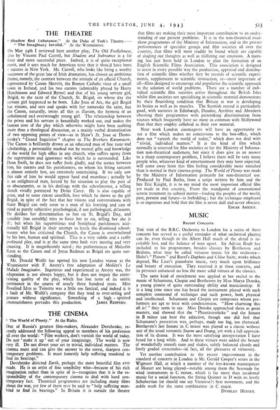THE THEATRE
" Shadow ilEnd Substance." At the Duke of York's Theatre.- " The Imaginary Invalid." At the Westminster.
ON May 14th I reviewed here another play, The Old Foolishness, also by Vincent Paul Carroll, but Shadow and Substance is a far
finer and more successful piece. Indeed, it is of quite- exceptional
merit, and it says much for American taste that it should have been success in New York. Mr. Carroll, who looks like being a worthy successor of the great lute of Irish dramatists, has chosen an ambitious theme, namely, the contrast between the attitude of an official Church, represented by Canon Skerritt, the Roman Catholic vicar of a small town in Ireland, and his two curates (admirably played by Harry Hutchinson and Edward Byrne) and that of his young servant girl, Brigid, to the saint of the Church, St.. Brigid, on whose day the servant girl happened to be born. Like Joan of Arc, the girl Brigid has visions, and sees and speaks with her namesake the saint, but the Canon, naturally, treats all this as illusion, the hysteria of an unbalanced and overwrought young girl. The relationship between the priest and his servant is beautifully worked out, and makes the human core of the play which otherwise might have been nothing more than a theological discussion, or a mainly verbal dramatisation of two opposing points of view—as in Shaw's St. Joan or Dosto- ievsky's " Grand Inquisitor " chapter in The Brothers Karamazov. The Canon is brilliantly drawn as an educated man of fine taste- and scholarship, a personality marked out by mental gifts and knowledge of the world for high office in any church, who suffers agony from the superstition and ignorance with which he is surrounded. Like Dean Swift, he does not suffer fools gladly, and the scenes between him, his curates and his parishioners, on whom his biting sarcasm is almost entirely lost, are extremely entertaining. If we only saw this side of him he would appear hard and mundane ; actually he is an enlightened man, forced by his situation to play the part of an obscurantist, as in his dealings with the schoolmaster, a telling sketch vividly portrayed by Denis Carey. He is also capable of great, and to some extent unselfish, love which he shows to the girl Brigid, in spite of the fact that her visions and conversations with Saint Brigid can only seem to 'a man of his learning and cast of mind as purely subjective psychological, if not pathological, delusions. He dislikes her determination to fast on St. Brigid's Day, and sensibly (too sensibly) tries to force her to eat, telling her she is ill ; but when his superstitious and benighted parishioners acci- dentally kill Brigid in their attempt to lynch the dismissed school- master who has criticised the Church, the Canon is overwhelmed by his loss, human and spiritual. This is a very subtle and a really profound play, and• is at the same time both very moving and very amusing. It is magnificently acted ; the performances of Malcolm Keen as the Canon and of Joyce Redman as Brigid are quite out- standing.
Mr. Donald Wolfit has opened his new London season at the Westminster with F. Anstey's free- adaptation of Moliere's Le Malade Imaginaire. Ingenious and experienced as Anstey was, the adaptation is not always _happy, but it does not impair the enter- taining quality of the play, which has lost none of its satiric pertinence in the course of nearly three hundred years. Miss Rosalind 'den as Toinette was a little too farcical, and indeed it is a fault of Mr. Wolfit's company that they tend to over-acting and gesture without significance. Something of a high - spirited amateurishness pervades this production. JAMES REDFERN-


























 Previous page
Previous page